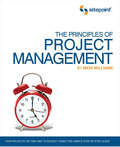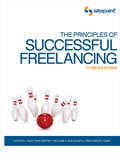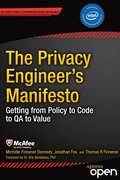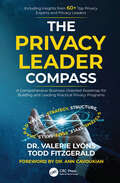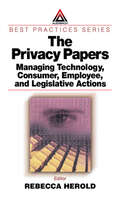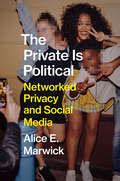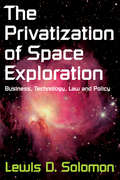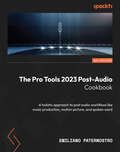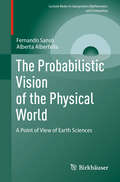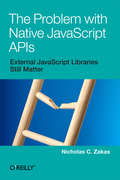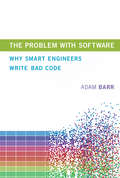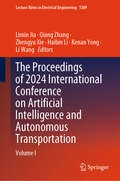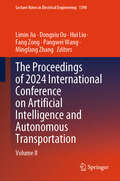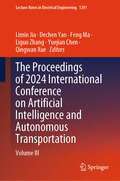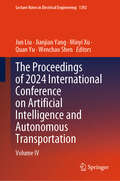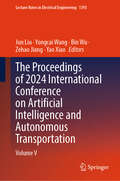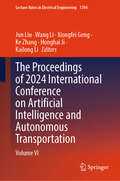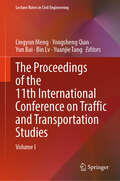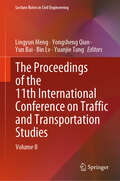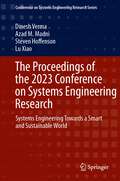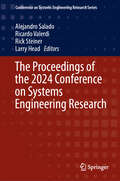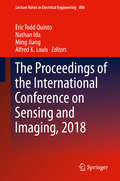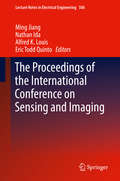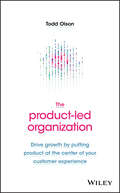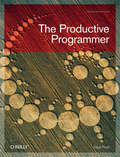- Table View
- List View
The Principles of Project Management (SitePoint (SitePoint (SitePoint (SitePoint: Project Management): Project Management)
by Meri WilliamsThe Principles of Project Management lays out clear steps that anyone can follow to get projects done right, and delivered on time.This full color book covers:Why Project Management is importantThe 6 fundamental truths of project managementGetting started: Discovering, Initiating, Planning and Resourcing a projectGetting the Job Done: Executing and controllingKeeping it Smooth: Communication, collaboration and managing changeFollowing through: Ongoing support and maintenance, measuring operational successResources: Review of various tools, recommended reading, professional resources for project managementShort, and to the point, this book aims to do to provide a solid foundation for anyone who finds themselves responsible for executing projects.From the Back CoverEvery project you manage will be unique. Scope, budgets, team dynamics, and timeframes will differ. As a project manager, the most important factor in achieving project success will be your understanding of The Principles Of Project Management. This book will show you that project management isn't rocket science: using the information contained in this book, you'll deliver projects on time and on budget, again and again.With The Principles Of Project Management you'll:Learn how to start every project on the right foot.Master the planning, execution, and control of your projects.Discover the secrets of effective communication and change management.Identify project warning signals and learn to keep your projects on track.Understand the benefits of using the right tools, resources, and people.Learn how to give a superstar project handover.And much, much more
The Principles of Successful Freelancing: Control Your Destiny - Become a Successful Freelancer Today!
by Miles BurkeThinking about becoming your own boss and embarking on the wonderful and rewarding journey of freelancing? The Principles of Successful Freelancing is for you. In this easy-to follow guide you'll learn what's important in transforming your skills into a booming freelance business.This book leads you through the entire process, from getting started, through to winning and keeping loyal clients. Running a successful freelance business is easy, and with the information in this book, you'll confidently turn your freelancing dream into a profitable reality. Learn how to make a smooth transition into freelancing Understand how to effectively manage your money Ensure you spend your time on the right activities Discover why a work/life balance is important Learn how your network can support you and your business Overcome your fear of sellingAnd much more ...The 12 Principles Of Successful Freelancing Get OrganizedKeep your workspace tidy and plan ahead(short- and long-term).Control StressRemain calm and work through issues to avoid early burnout..ResearchSpend quality time researching your proposed business-it's more than a five minute web surf.Be PassionateLove your work! You should enjoy what you do for a living.BudgetSave for a rainy day rather than spend every centas it comes in.Value your HealthBad health stops you from working. Take time to exercise and maintain a nutritious diet.Embrace SellingEnjoy the sales challenge-it's easier than you think!Satisfy CustomersDon't do average work-exceed their expectations and make them need you.Grow Your NetworkValue family and friends' support, and meet new people all the time.Maintain CashflowIt's what is in the bank that counts, not what you are billing-understand the difference.Continually LearnKeep acquiring new skills and knowledge, every week. Let it slip and you could be left behind.Achieve a Work/Life BalanceYour life should be more than work-maintain a good balance for health and success.
The Privacy Engineer's Manifesto: Getting from Policy to Code to QA to Value
by Jonathan Fox Michelle Finneran Dennedy Thomas R. Finneran"It''s our thesis that privacy will be an integral part of the next wave in the technology revolution and that innovators who are emphasizing privacy as an integral part of the product life cycle are on the right track. " --The authors of The Privacy Engineer''s Manifesto The Privacy Engineer''s Manifesto: Getting from Policy to Code to QA to Value is the first book of its kind, offering industry-proven solutions that go beyond mere theory and adding lucid perspectives on the challenges and opportunities raised with the emerging "personal" information economy. The authors, a uniquely skilled team of longtime industry experts, detail how you can build privacy into products, processes, applications, and systems. The book offers insight on translating the guiding light of OECD Privacy Guidelines, the Fair Information Practice Principles (FIPPs), Generally Accepted Privacy Principles (GAPP) and Privacy by Design (PbD) into concrete concepts that organizations, software/hardware engineers, and system administrators/owners can understand and apply throughout the product or process life cycle--regardless of development methodology--from inception to retirement, including data deletion and destruction. In addition to providing practical methods to applying privacy engineering methodologies, the authors detail how to prepare and organize an enterprise or organization to support and manage products, process, systems, and applications that require personal information. The authors also address how to think about and assign value to the personal information assets being protected. Finally, the team of experts offers thoughts about the information revolution that has only just begun, and how we can live in a world of sensors and trillions of data points without losing our ethics or value(s). . . and even have a little fun. The Privacy Engineer''s Manifesto is designed to serve multiple stakeholders: Anyone who is involved in designing, developing, deploying and reviewing products, processes, applications, and systems that process personal information, including software/hardware engineers, technical program and product managers, support and sales engineers, system integrators, IT professionals, lawyers, and information privacy and security professionals. This book is a must-read for all practitioners in the personal information economy. Privacy will be an integral part of the next wave in the technology revolution; innovators who emphasize privacy as an integral part of the product life cycle are on the right track. Foreword by Dr. Eric Bonabeau, PhD, Chairman, Icosystem, Inc. & Dean of Computational Sciences, Minerva Schools at KGI. What you''ll learn What''s at stake as concerns data privacy become critical considerations for users, developers, and enterprise stakeholders Comprehensive foundational understanding of the issues and how they are interconnected What the emerging job description of "privacy engineer" means Key development models for privacy architecture How to assemble an engineering privacy tool box (including developing privacy use cases and requirements Organizational design implications of privacy engineering Quality Assurance (QA) methodologies for privacy policy compliance Models for valuing data The 10-point Manifesto of the Privacy Engineer Who this book is for The Privacy Engineer''s Manifesto is designed to serve multiple stakeholders: Anyone who is involved in designing, developing, deploying, and reviewing products, processes, applications, and systems that process personal information, including software/hardware engineers, technical program and product managers, support and sales engineers, system integrators, IT professionals, lawyers, and information privacy and security professionals. A must read for all practitioners in the personal information economy. Table of Contents Part 1 - Getting Your Head Around Privacy Chapter 1: Technology Evolution and People Chapter 2: Foundational Concepts and Frameworks Chapter 3: Data and Privacy Governance Concepts Part 2 - The Privacy Engineering Pr...
The Privacy Leader Compass: A Comprehensive Business-Oriented Roadmap for Building and Leading Practical Privacy Programs
by Todd Fitzgerald Valerie LyonsCongratulations! Perhaps you have been appointed as the Chief Privacy Officer (CPO) or the Data Protection Officer (DPO) for your company. Or maybe you are an experienced CPO/DPO, and you wonder – "what can I learn from other successful privacy experts to be even more effective?" Or perhaps you are considering a move from a different career path and deciding if this is the right direction for you. Seasoned award-winning Privacy and Cybersecurity leaders Dr. Valerie Lyons (Dublin, Ireland) and Todd Fitzgerald (Chicago, IL USA) have teamed up with over 60 award-winning CPOs, DPOs, highly respected privacy/data protection leaders, data protection authorities, and privacy standard setters who have fought the tough battle. Just as the #1 best-selling and CANON Cybersecurity Hall of Fame winning CISO Compass: Navigating Cybersecurity Leadership Challenges with Insights from Pioneers book provided actionable advice to Chief Information Security Officers, The Privacy Leader Compass is about straight talk – delivering a comprehensive privacy roadmap applied to, and organized by, a time-tested organizational effectiveness model (the McKinsey 7-S Framework) with practical, insightful stories and lessons learned. You own your continued success as a privacy leader. If you want a roadmap to build, lead, and sustain a program respected and supported by your board, management, organization, and peers, this book is for you.
The Privacy Papers: Managing Technology, Consumer, Employee and Legislative Actions (ISSN)
by Rebecca HeroldToday, more than ever, organizations have to cope with increased concerns regarding privacy issues. These concerns are not limited to consumer fears about how information collected by Web sites will be used or misused. They also involve broader issues, including data collected for direct response marketing, privacy of financial and health records,
The Private Is Political: Networked Privacy and Social Media
by Alice E. MarwickA compelling firsthand investigation of how social media and big data have amplified the close relationship between privacy and inequality Online privacy is under constant attack by social media and big data technologies. But we cannot rely on individual actions to remedy this—it is a matter of social justice. Alice E. Marwick offers a new way of understanding how privacy is jeopardized, particularly for marginalized and disadvantaged communities—including immigrants, the poor, people of color, LGBTQ+ populations, and victims of online harassment. Marwick shows that few resources or regulations for preventing personal information from spreading on the internet. Through a new theory of “networked privacy,” she reveals how current legal and technological frameworks are woefully inadequate in addressing issues of privacy—often by design. Drawing from interviews and focus groups encompassing a diverse group of Americans, Marwick shows that even heavy social media users care deeply about privacy and engage in extensive “privacy work” to protect it. But people are up against the violation machine of the modern internet. Safeguarding privacy must happen at the collective level.
The Privatization of Space Exploration: Business, Technology, Law and Policy (The\privatization Of Space Exploration Ser.)
by Lewis D. SolomonSpace was at the center of America's imagination in the 1960s. President John F. Kennedy's visionary statement captured the mood of the day: "We choose to go to the moon in this decade and do the other things, not because they are easy, but because they are hard." The Apollo mission's success in July 1969 made almost anything seem possible, but the Cold War made space flight the province of governmental agencies in the United States. When the Apollo program ended in 1972, space lost its hold on the public interest, as the great achievements wound down. Entrepreneurs are beginning to pick up the slack-looking for safer, more reliable, and more cost effective ways of exploring space. Entrepreneurial activity may make create a renaissance in human spaceflight. The private sector can energize the quest for space exploration and shape the race for the final frontier. Space entrepreneurs and private sector firms are making significant innovations in space travel. They have plans for future tourism in space and safer shuttles. Solomon details current US and international laws dealing with space use, settlement, and exploration, and offers policy recommendations to facilitate privatization. As private enterprise takes hold, it threatens to change the space landscape forever. Individuals are designing spacecraft, start-up companies are testing prototypes, and reservations are being taken for suborbital space flights. With for-profit enterprises carving out a new realm, it is entirely possible that space will one day be a sea of hotels and/or a repository of resources for big business. It is important that regulations are in place for this eventuality. These new developments have great importance, huge implications, and urgency for everyone.
The Pro Tools 2023 Post-Audio Cookbook: A holistic approach to post audio workflows like music production, motion picture, and spoken word
by Emiliano PaternostroTake your projects from vision to victory with Avid Pro Tools in this part-color guide by delivering high-quality results with perfect recipes for every challengeKey FeaturesLearn to edit audio quickly and efficiently using different techniquesDiscover advanced automation techniques used during a mix sessionUnlock Pro Tools' most powerful features and explore their usesPurchase of the print or Kindle book includes a free PDF eBookBook DescriptionPro Tools has long been an industry-standard Digital Audio Workstation (DAW) for audio professionals, but it can often be overwhelming for new and experienced users alike. The Pro Tools 2023 Post-Audio Cookbook acts as a reference guide to the software and breaks down each stage of a project into manageable phases. From planning a session, editing a sequence, performing a mix to printing the final masters, you can approach this book either sequentially or peruse the self-contained recipes. You’ll come to grips with workflows for music production, motion picture, and spoken word production, helping you gain expertise in the area of your choice. You'll learn aspects of music mixing like side chain processing to keep instruments from overshadowing each other and conforming for motion picture. The author’s expertise with Pro Tools will help you discover and incorporate different techniques into your workflows. You’ll also learn to build consistent and replicable workflows and templates by understanding what happens behind the scenes in Pro Tools. With this cookbook, you’ll be able to focus on the creative aspects of your audio production and not get mired by the technical hurdles. By the end of this book, you’ll be well-equipped to handle even the most complex features of Pro Tools to deliver immaculate results for your clients.What you will learnExplore the inner workings of Pro ToolsPlan and organize projects effectivelyEdit audio quickly and efficientlyUnderstand and explore the usage of audio routingBuild effective mix templatesDeliver custom solutions for varied service requirementsUse advanced mixing techniques to enhance sound tracksPick appropriate use cases for different audio effects and pluginsWho this book is forThe book is for audio professionals, sound designers/editors, music engineers, podcast producers, re-recordist mixers, and students looking to learn about Pro Tools and its features. A basic understanding of Digital Audio Workstations and its operations such as import, edit, mix and bounce is a must.
The Probabilistic Vision of the Physical World: A Point of View of Earth Sciences (Lecture Notes in Geosystems Mathematics and Computing)
by Fernando Sansò Alberta AlbertellaThis book investigates the relationship between empirical reality and theoretical modelling in Earth sciences, focusing on how empirical experiments and theoretical models interact. It explores the connection between statistics and probability theory, emphasizing the importance of these tools in understanding the physical world. The first chapter addresses the frequency-probability antinomy, while the second chapter discusses the sources of randomness in modelling. Chapters 3 and 4 delve into statistical inference, covering estimation theory and testing theory. Chapter 5 examines the relationship between discrete-finite models and continuous-infinite dimensional models, particularly random fields, making the concepts accessible to geodesists and geophysicists. Chapter 6 explores modern machine learning and deep learning, highlighting their roots in traditional statistical methods and neural networks. The book concludes with a caution against relying solely on empirical evidence and "black box" algorithms, advocating for the integration of physical laws with empirical models to advance understanding of the physical world. The book is primarily intended for graduate students and researchers in the field of earth sciences with a basic background in probability theory and statistics.
The Problem with Native JavaScript APIs: External JavaScript Libraries Still Matter
by Nicholas C. ZakasMany features inspired by popular JavaScript libraries are now available as native JavaScript APIs in today’s powerful browsers. While that may seem convenient given all of the JavaScript you need to write, relying on these APIs will only make code maintenance more difficult in the long run.In this report, Nicholas Zakas—consultant and former front-end tech leader at Yahoo!—provides a case study to show how different browsers can develop native APIs for the same specification and still end up with different interpretations. You’ll discover how these APIs can tie your code to specific browsers, forcing you to upgrade application logic whenever new browsers and new browser versions are released.
The Problem with Software: Why Smart Engineers Write Bad Code
by Adam BarrAn industry insider explains why there is so much bad software—and why academia doesn't teach programmers what industry wants them to know. Why is software so prone to bugs? So vulnerable to viruses? Why are software products so often delayed, or even canceled? Is software development really hard, or are software developers just not that good at it? In The Problem with Software, Adam Barr examines the proliferation of bad software, explains what causes it, and offers some suggestions on how to improve the situation. For one thing, Barr points out, academia doesn't teach programmers what they actually need to know to do their jobs: how to work in a team to create code that works reliably and can be maintained by somebody other than the original authors. As the size and complexity of commercial software have grown, the gap between academic computer science and industry has widened. It's an open secret that there is little engineering in software engineering, which continues to rely not on codified scientific knowledge but on intuition and experience. Barr, who worked as a programmer for more than twenty years, describes how the industry has evolved, from the era of mainframes and Fortran to today's embrace of the cloud. He explains bugs and why software has so many of them, and why today's interconnected computers offer fertile ground for viruses and worms. The difference between good and bad software can be a single line of code, and Barr includes code to illustrate the consequences of seemingly inconsequential choices by programmers. Looking to the future, Barr writes that the best prospect for improving software engineering is the move to the cloud. When software is a service and not a product, companies will have more incentive to make it good rather than “good enough to ship."
The Proceedings of 2024 International Conference on Artificial Intelligence and Autonomous Transportation: Volume I (Lecture Notes in Electrical Engineering #1389)
by Li Wang Qiang Zhang Limin Jia Zhengyu Xie Haibin Li Kenan YongThis book reflects the latest research trends, methods and experimental results in the field of Artificial Intelligence and Autonomous Transportation, which covers abundant state-of-the-art research theories and ideas. As a vital research area that is highly relevant to current developments in a number of technological domains, the topics covered include Autonomous Transportation Systems, Autonomous Transportation Management and Control Technology, Autonomous Transportation Equipment Technology, Vehicular Networking and Information Security, Emerging Technologies and Future Mobility, Intelligent water transportation technology, Cross-Domain Transportation Technology, and so on. The goal of the proceedings is to provide a major interdisciplinary forum for researchers, engineers, academics, and industry professionals to present the most innovative research and development in the field of Artificial Intelligence and Autonomous Transportation. Engineers and researchers from academia, industry, and government will also explore an insight view of the solutions that combine ideas from multiple disciplines in this area. The volumes serve as an excellent reference work for researchers and graduate students working in the areas of rail transportation, electrical engineering, and information technology.
The Proceedings of 2024 International Conference on Artificial Intelligence and Autonomous Transportation: Volume II (Lecture Notes in Electrical Engineering #1390)
by Limin Jia Hui Liu Dongxiu Ou Fang Zong Pangwei Wang Mingfang ZhangThis book reflects the latest research trends, methods and experimental results in the field of Artificial Intelligence and Autonomous Transportation, which covers abundant state-of-the-art research theories and ideas. As a vital research area that is highly relevant to current developments in a number of technological domains, the topics covered include Autonomous Transportation Systems, Autonomous Transportation Management and Control Technology, Autonomous Transportation Equipment Technology, Vehicular Networking and Information Security, Emerging Technologies and Future Mobility, Intelligent water transportation technology, Cross-Domain Transportation Technology, and so on. The goal of the proceedings is to provide a major interdisciplinary forum for researchers, engineers, academics, and industry professionals to present the most innovative research and development in the field of Artificial Intelligence and Autonomous Transportation. Engineers and researchers from academia, industry, and government will also explore an insight view of the solutions that combine ideas from multiple disciplines in this area. The volumes serve as an excellent reference work for researchers and graduate students working in the areas of rail transportation, electrical engineering, and information technology.
The Proceedings of 2024 International Conference on Artificial Intelligence and Autonomous Transportation: Volume III (Lecture Notes in Electrical Engineering #1391)
by Limin Jia Dechen Yao Feng Ma Liguo Zhang Yuejian Chen Qingwan XueThis book reflects the latest research trends, methods and experimental results in the field of Artificial Intelligence and Autonomous Transportation, which covers abundant state-of-the-art research theories and ideas. As a vital research area that is highly relevant to current developments in a number of technological domains, the topics covered include Autonomous Transportation Systems, Autonomous Transportation Management and Control Technology, Autonomous Transportation Equipment Technology, Vehicular Networking and Information Security, Emerging Technologies and Future Mobility, Intelligent water transportation technology, Cross-Domain Transportation Technology, and so on. The goal of the proceedings is to provide a major interdisciplinary forum for researchers, engineers, academics, and industry professionals to present the most innovative research and development in the field of Artificial Intelligence and Autonomous Transportation. Engineers and researchers from academia, industry, and government will also explore an insight view of the solutions that combine ideas from multiple disciplines in this area. The volumes serve as an excellent reference work for researchers and graduate students working in the areas of rail transportation, electrical engineering, and information technology.
The Proceedings of 2024 International Conference on Artificial Intelligence and Autonomous Transportation: Volume IV (Lecture Notes in Electrical Engineering #1392)
by Quan Yu Jun Liu Jianjian Yang Minyi Xu Wenchao ShenThis book reflects the latest research trends, methods and experimental results in the field of Artificial Intelligence and Autonomous Transportation, which covers abundant state-of-the-art research theories and ideas. As a vital research area that is highly relevant to current developments in a number of technological domains, the topics covered include Autonomous Transportation Systems, Autonomous Transportation Management and Control Technology, Autonomous Transportation Equipment Technology, Vehicular Networking and Information Security, Emerging Technologies and Future Mobility, Intelligent water transportation technology, Cross-Domain Transportation Technology, and so on. The goal of the proceedings is to provide a major interdisciplinary forum for researchers, engineers, academics, and industry professionals to present the most innovative research and development in the field of Artificial Intelligence and Autonomous Transportation. Engineers and researchers from academia, industry, and government will also explore an insight view of the solutions that combine ideas from multiple disciplines in this area. The volumes serve as an excellent reference work for researchers and graduate students working in the areas of rail transportation, electrical engineering, and information technology.
The Proceedings of 2024 International Conference on Artificial Intelligence and Autonomous Transportation: Volume V (Lecture Notes in Electrical Engineering #1393)
by Bin Wu Jun Liu Yongcai Wang Zehao Jiang Yao XiaoThis book reflects the latest research trends, methods and experimental results in the field of Artificial Intelligence and Autonomous Transportation, which covers abundant state-of-the-art research theories and ideas. As a vital research area that is highly relevant to current developments in a number of technological domains, the topics covered include Autonomous Transportation Systems, Autonomous Transportation Management and Control Technology, Autonomous Transportation Equipment Technology, Vehicular Networking and Information Security, Emerging Technologies and Future Mobility, Intelligent water transportation technology, Cross-Domain Transportation Technology, and so on. The goal of the proceedings is to provide a major interdisciplinary forum for researchers, engineers, academics, and industry professionals to present the most innovative research and development in the field of Artificial Intelligence and Autonomous Transportation. Engineers and researchers from academia, industry, and government will also explore an insight view of the solutions that combine ideas from multiple disciplines in this area. The volumes serve as an excellent reference work for researchers and graduate students working in the areas of rail transportation, electrical engineering, and information technology.
The Proceedings of 2024 International Conference on Artificial Intelligence and Autonomous Transportation: Volume VI (Lecture Notes in Electrical Engineering #1394)
by Ke Zhang Jun Liu Wang Li Xiongfei Geng Honghai Ji Kailong LiThis book reflects the latest research trends, methods and experimental results in the field of Artificial Intelligence and Autonomous Transportation, which covers abundant state-of-the-art research theories and ideas. As a vital research area that is highly relevant to current developments in a number of technological domains, the topics covered include Autonomous Transportation Systems, Autonomous Transportation Management and Control Technology, Autonomous Transportation Equipment Technology, Vehicular Networking and Information Security, Emerging Technologies and Future Mobility, Intelligent water transportation technology, Cross-Domain Transportation Technology, and so on. The goal of the proceedings is to provide a major interdisciplinary forum for researchers, engineers, academics, and industry professionals to present the most innovative research and development in the field of Artificial Intelligence and Autonomous Transportation. Engineers and researchers from academia, industry, and government will also explore an insight view of the solutions that combine ideas from multiple disciplines in this area. The volumes serve as an excellent reference work for researchers and graduate students working in the areas of rail transportation, electrical engineering, and information technology.
The Proceedings of the 11th International Conference on Traffic and Transportation Studies: Volume I (Lecture Notes in Civil Engineering #616)
by Lingyun Meng Yongsheng Qian Yun Bai Bin Lv Yuanjie TangThis book reflects the latest research trends, methods and experimental results in the field of traffic and transport, covering a wealth of state-of-the-art research theories and ideas. As a vital field of research, highly relevant to current developments in a number of technological areas, the topics covered include traffic data analysis, transport planning, multimodal and integrated transport, modelling and analysis of passenger behaviour, etc. The aim of the proceedings is to provide a major interdisciplinary forum for researchers, engineers, academics and industry professionals to present the most innovative research and development in the field of traffic and transportation. Engineers and researchers from academia, industry and government will also explore the solutions that combine ideas from different disciplines in the field. The volumes serve as an excellent reference for researchers and graduate students working in the field of traffic and transportation.
The Proceedings of the 11th International Conference on Traffic and Transportation Studies: Volume II (Lecture Notes in Civil Engineering #617)
by Lingyun Meng Yongsheng Qian Yun Bai Bin Lv Yuanjie TangThis book reflects the latest research trends, methods and experimental results in the field of traffic and transport, covering a wealth of state-of-the-art research theories and ideas. As a vital field of research, highly relevant to current developments in a number of technological areas, the topics covered include traffic data analysis, transport planning, multimodal and integrated transport, modelling and analysis of passenger behaviour, etc. The aim of the proceedings is to provide a major interdisciplinary forum for researchers, engineers, academics and industry professionals to present the most innovative research and development in the field of traffic and transportation. Engineers and researchers from academia, industry and government will also explore the solutions that combine ideas from different disciplines in the field. The volumes serve as an excellent reference for researchers and graduate students working in the field of traffic and transportation.
The Proceedings of the 2023 Conference on Systems Engineering Research: Systems Engineering Towards a Smart and Sustainable World (Conference on Systems Engineering Research Series)
by Azad M. Madni Dinesh Verma Lu Xiao Steven HoffensonThe 20th International Conference on Systems Engineering Research (CSER 2023) pushes the boundaries of systems engineering research and responds to new challenges for systems engineering. CSER 2023 invited researchers and practitioners to submit their work in alignment with the thematic focus on a smart and sustainable world. CSER was founded in 2003 by Stevens Institute of Technology and the University of Southern California, and in 2023 the conference returned to the Stevens campus in Hoboken, New Jersey.
The Proceedings of the 2024 Conference on Systems Engineering Research (Conference on Systems Engineering Research Series)
by Rick Steiner Ricardo Valerdi Alejandro Salado Larry HeadThe 22nd International Conference on Systems Engineering Research (CSER 2024) pushes the boundaries of systems engineering research and responds to new challenges for systems engineering. CSER was founded in 2003 by Stevens Institute of Technology and the University of Southern California. In 2024 the conference was hosted by the University of Arizona, home to the first-ever established Department of Systems Engineering. The following foundational research topics are included: • Scientific Foundations of Systems Engineering • Digital Engineering, Digital Twins • Digital Transformation • Advances in Model-Based Systems Engineering (MBSE) • Value-based and Agile Systems Engineering • Artificial Intelligence for Systems and Software Engineering (AI4SE) • Systems and Software Engineering for Artificial Intelligence (SE4AI) • Cybersecurity and System Security Engineering • Uncertainty and Complexity Management • Trust and Autonomous Systems • Human-Systems Integration • Systems of Systems • Social Systems Engineering • Systems Thinking • Advances in requirements engineering, systems architecture, systems integration, and verification and validation. The 21st Annual Conference on Systems Engineering Research (CSER 2024) was poised to push the boundaries of systems engineering, embracing a wide array of themes from its scientific underpinnings to the forefront of digital engineering transformation and the seamless integration of artificial intelligence within systems and software engineering. Delving into cutting-edge topics such as Model-Based Systems Engineering (MBSE), cybersecurity, and the management of uncertainty and complexity, CSER 2024 tackled the varied challenges and seize the opportunities emerging in the field. The conference's commitment to blending theoretical insights with practical innovations makes it a pivotal event for the systems engineering community.
The Proceedings of the International Conference on Sensing and Imaging, 2018 (Lecture Notes in Electrical Engineering #606)
by Ming Jiang Nathan Ida Alfred K. Louis Eric Todd QuintoThis book proceedings collects a number of papers presented at the International Conference on Sensing and Imaging, which was held at Guangxi University of Science and Technology from October 15-18, 2018. Sensing and imaging is an interdisciplinary field covering a variety of sciences and techniques such as optics, electricity, magnetism, heat, sound, and computing technologies. The field has diverse applications of interest such as image processing techniques.The results in the book bridge the gap between theory and applications, translating techniques into better products. The text will appeal to students, professionals and researchers alike.
The Proceedings of the International Conference on Sensing and Imaging: Chengdu University Of Information Technology, Chengdu, Sichuan, China, On June 5-7 2017 (Lecture Notes in Electrical Engineering #506)
by Ming Jiang Nathan Ida Alfred K. Louis Eric Todd QuintoThis book collects a number of papers presented at the International Conference on Sensing and Imaging, which was held at Chengdu University of Information Technology on June 5-7, 2017. Sensing and imaging is an interdisciplinary field covering a variety of sciences and techniques such as optics, electricity, magnetism, heat, sound, mathematics, and computing technology. The field has diverse applications of interest such as sensing techniques, imaging, and image processing techniques. This book will appeal to professionals and researchers within the field.
The Product-Led Organization: Drive Growth By Putting Product at the Center of Your Customer Experience
by Todd OlsonA playbook on product-led strategy for software product teams There's a common strategy used by the fastest growing and most successful businesses of our time. These companies are building their entire customer experience around their digital products, delivering software that is simple, intuitive and delightful, and that anticipates and exceeds the evolving needs of users. Product-led organizations make their products the vehicle for acquiring and retaining customers, driving growth, and influencing organizational priorities. They represent the future of business in a digital-first world. This book is meant to help you transform your company into a product-led organization, helping to drive growth for your business and advance your own career. It provides: A holistic view of the quantitative and qualitative insights teams need to make better decisions and shape better product experiences. A guide to setting goals for product success and measuring progress toward meeting them. A playbook for incorporating sales and marketing activities, service and support, as well as onboarding and education into the product Strategies for soliciting, organizing and prioritizing feedback from customers and other stakeholders; and how to use those inputs to create an effective product roadmap The Product-Led Organization: Drive Growth By Putting Product at the Center of Your Customer Experience was written by the co-founder and CEO of Pendo—a SaaS company and innovator in building software for digital product teams. The book reflects the author’s passion and dedication for sharing what it takes to build great products.
The Productive Programmer (Theory in Practice (O'Reilly))
by Neal FordAnyone who develops software for a living needs a proven way to produce it better, faster, and cheaper. The Productive Programmer offers critical timesaving and productivity tools that you can adopt right away, no matter what platform you use. Master developer Neal Ford not only offers advice on the mechanics of productivity-how to work smarter, spurn interruptions, get the most out your computer, and avoid repetition-he also details valuable practices that will help you elude common traps, improve your code, and become more valuable to your team. You'll learn to:Write the test before you write the codeManage the lifecycle of your objects fastidiouslyBuild only what you need now, not what you might need laterApply ancient philosophies to software developmentQuestion authority, rather than blindly adhere to standardsMake hard things easier and impossible things possible through meta-programmingBe sure all code within a method is at the same level of abstractionPick the right editor and assemble the best tools for the jobThis isn't theory, but the fruits of Ford's real-world experience as an Application Architect at the global IT consultancy ThoughtWorks. Whether you're a beginner or a pro with years of experience, you'll improve your work and your career with the simple and straightforward principles in The Productive Programmer.
